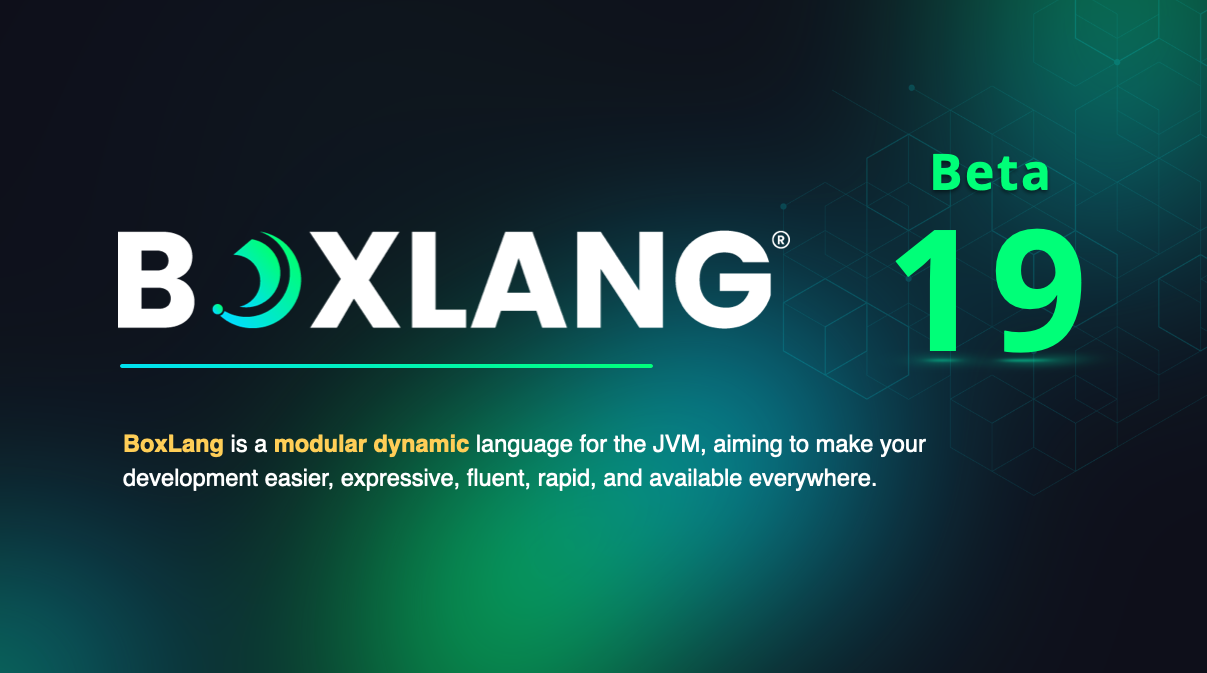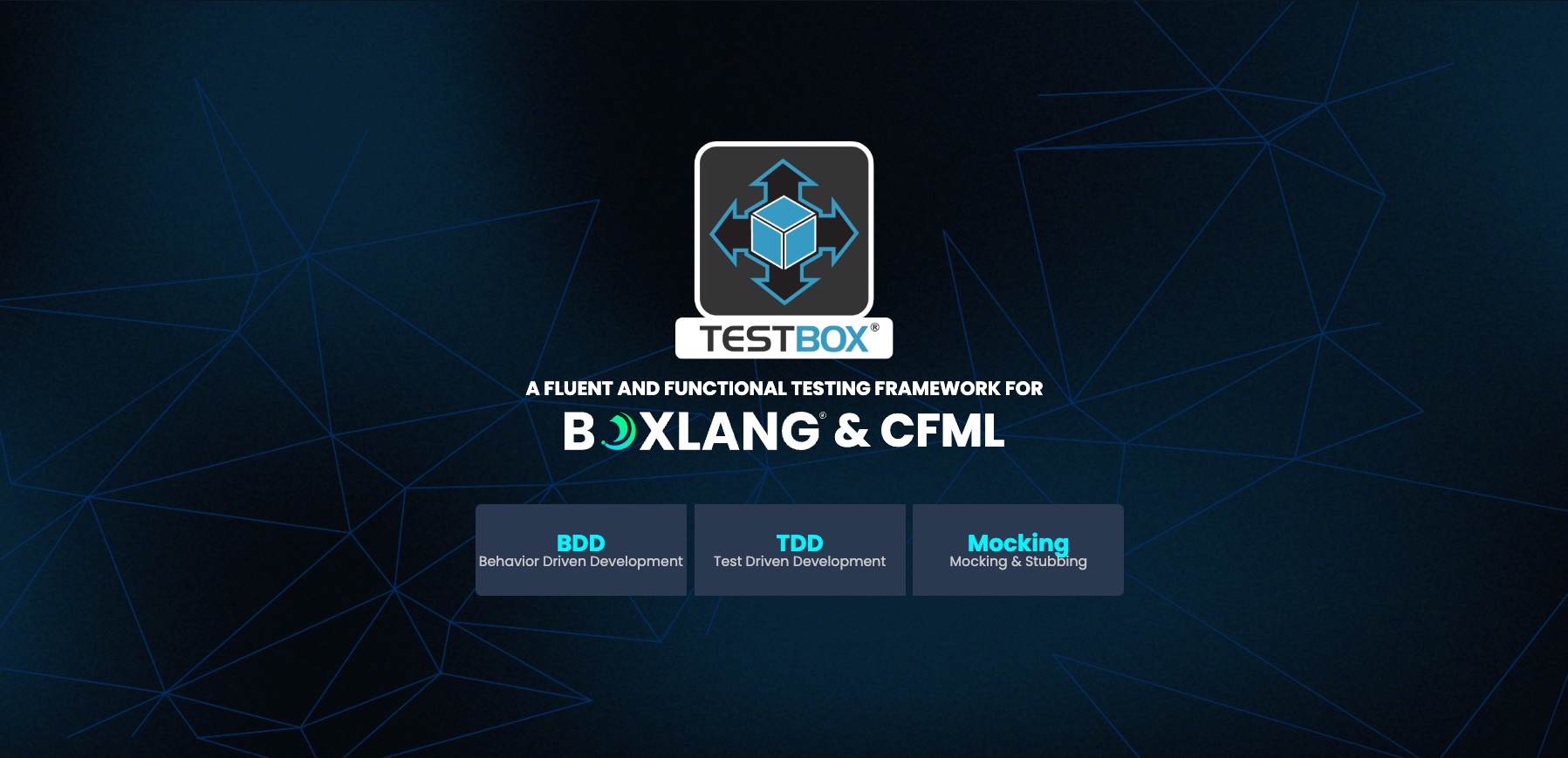Welcome to BoxLang 1.0.0 Beta 19, where innovation and performance converge to redefine dynamic development on the JVM. This release marks a significant leap forward with the introduction of the ASMBoxPiler, enabling direct BoxLang-to-Java bytecode compilation for unparalleled speed and efficiency. By streamlining the build process, developers can now achieve up to 4x faster performance, setting a new standard for seamless Java integration. Alongside this, enhancements like star-imports, module-specific class imports with the @ notation, and the introduction of STOMP protocols for websockets bring flexibility, precision, and power to your development toolbox. Dive into this transformative update and unlock the full potential of BoxLang!
What is BoxLang?
BoxLang is a modern dynamic JVM language that can be deployed on multiple runtimes: operating system (Windows/Mac/*nix/Embedded), web server, lambda, iOS, android, web assembly, and more. BoxLang combines many features from different programming languages, including Java, CFML, Python, Ruby, Go, and PHP, to provide developers with a modern and expressive syntax.
It is also a drop-in replacement for Adobe ColdFusion and Lucee Engines.

How to get started?
Visit our docs at https://boxlang.ortusbooks.com and get coding today. If you want to try it out on the web then go to our online REPL at https://try.boxlang.io. You can also checkout our YouTube playlist: https://www.youtube.com/playlist?list=PLNE-ZbNnndB-40LvAbeSeT2Oi3V2gm_B8
Release Notes
Here are the latest release notes: https://boxlang.ortusbooks.com/readme/release-history/1.0.0-beta19
New Features
BL-667 ASMBoxPiler to do direct Java bytecode creation
With the implementation of the ASMBoxPiler, developers can now compile BoxLang source code directly into Java bytecode, streamlining the process and improving performance by over 4 times. This feature eliminates the intermediate steps previously required for code execution, resulting in faster compilation times and seamless integration with Java environments.

The JavaBoxPiler will remain in BoxLang as it's an integral debugging piece. It might be moved later to it's own module, but having the capability to transpile BoxLang/CFML code to Java will remain.

The direct bytecode generation allows for enhanced optimization and leverages the full potential of Java's JVM, leading to more efficient and scalable applications. By default, right now this is an experimental feature and it will need to be turned ON in order to use it via our boxlang.json configuration, via the compiler : "asm"
BL-232 Star-import for boxlang classes
You can now use * imports for BoxLang classes, which allows you to bring in all the classes found in the imported package into the class namespace so you can create them by just using their name. In practice, the use of star-imports is a trade-off between convenience and potential issues such as namespace collisions. While they can make code more concise, especially when many classes from a package are needed, they may also import unintended classes, leading to ambiguities. Therefore, it's generally recommended to use specific imports when only a few classes are required and reserve star-imports for when numerous classes from the same package are genuinely required.
BL-653 Java wildcard imports from loaded jars
The feature BL-653 enhances import capabilities by allowing Java wildcard imports from loaded JAR files. This means you can use the * notation to import all classes within a JAR package, reducing the need to import each class manually. This functionality streamlines the process of utilizing numerous classes within a package and is particularly beneficial when dealing with extensive libraries. However, similar to BoxLang star-imports, it is essential to be aware of possible namespace conflicts and ensure that unintended classes do not get imported, maintaining code clarity and preventing ambiguity.
BL-646 Ability to import/create BoxLang classes from modules via direct `@{moduleName}` notation.
The @ notation in BoxLang’s import system allows for more efficient and precise class referencing. By explicitly addressing classes from a specific module, performance is improved because it avoids the need for BoxLang to search through all available modules, reducing ambiguity in cases where classes with the same name exist in different modules. The module’s root serves as the base for addressing the class.
Here’s a breakdown of how it works:
By using this method, developers can avoid potential issues like performance degradation due to unnecessary module scanning and the possibility of naming conflicts. It provides a clear and concise way to manage dependencies and class imports in BoxLang.
BL-647 Ability to import create java classes from modules explicitly using the `@`notation
Just like with BoxLang classes, you can also do the same for all Java libraries modules are packaged with. This allows you to import and create Java classes from specific modules by addressing them using the @ notation.
The following were support tickets for all of these functionalities
- BL-648 Import Definitions now support module addressing for simple, wildcard and aliases
- BL-657 JavaResolver module targeted resolution
BL-658 MIgrate AST Capture to it's own experimental flag
If you want to capture AST JSON for debugging purposes you will need to activate the new AST experimental flag:
BL-612 Add STOMP subprotocols in miniserver
We continue to make great strides with easy websocket support for BoxLang. Now we have added our very own STOMP implementation which makes our websockets behave like AMQP Messaging Brokers like RabbitMQ.
https://community.ortussolutions.com/t/introducing-the-socketbox-stomp-broker-demo/10396
Improvements
BL-328 Move CFID to compat module
BL-637 Have servlet runtime return actual pagecontext object instead of fake
BL-644 Update the allowedFileOperationExtensions and disallowedFileOperationExtensions to the security block
BL-650 Allow casting to array of primitive types
BL-652 Improve exception when trying to invoke null as a function
BL-654 Get ColdBox Loading via ASM
BL-655 Improve logic surrounding loading of pre-compiled source files
BL-660 added a `isCommitted()` to the PageContext to match the servlet response to assist when doing resets without exceptions
BL-661 StopGaps and config from cfconfig.json to boxlang.json
BL-662 NotImplemented updated to check if it's a string and if empty, then ignore it to provide leeway
BL-666 Rename default sessions cache to `bxSessions` to create the `bx` prefix standards. Add configuration to boxlang.json
Bug
BL-635 boxlang invokes private onApplicationStart
BL-636 expandPath does not preserve file system case
BL-639 cfml2wddx action missing
BL-642 deserializeJSON not handling white space / control characters
BL-645 Update parser to allow for `@module` notations on imports and `new` operators
BL-649 listFind() and listFindNoCase() are allowing partial matches
BL-651 Can't dump null in console
BL-659 Cannot invoke "java.lang.CharSequence.length()" because "this.text" is null




Add Your Comment